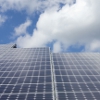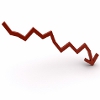Why to clean?
It is nescessary to clean solar panels, thats a fact. The question is how often.
Research
2) Types of pollution
Pollution can be divided by it's type and placement on panels.
By placement:
Local dirt may not lower effectivity so much, however it is more dangerous then area wide dirt. Why? Because it does cover just a segment of a panel and if its big enough, the segment under the dirt produce no energy. Segments, which are next to this cloaked segment are starting to overheat and will be permanently damaged if remained in this state for a long time. Moss and lichen is the worst of local dirts - it does grow and it won't be ever washed away by rain. 90% or more powerplants are in range of lichen or moss spores. This problem is Europe-wide and must be paid attention to.
Clean your panels regulary, so you dont have to worry abot the damage made by local dirt and to gain money from increased (or non-decreasing) effectivity of your panels.
By type
Area wide dirt
Research
  |
Both scientific studies everywhere in the world and our experience confirm a fact, that it is nescessary to clean everything, including solar panels. This fact however is not well known among common population and owners of solar powerplants. Marketing of many business companies, which sell solar panels mistaken them. Many of those companies claimed that their panels don't have to be cleaned in the future. They claimed "self-cleaning" effect of rain is all the panels need. Well it is not. Solar panels need service and professional cleaning once in a time. How often, that's another question. Following scientific studies are very important for the case of solar panels cleaning. It is more importnant, that they were made in Europe, so they are applicable to many european states. Both studies were executed by college professor H. Haeberlin, who is studying the effect of solar panels degradation for more, then 30 years. Those studies were not executed by private companies, they are highly scientific, so they should be independent, therefore we chose them as decisive. |
  | Even those studies are not perfect - the problem is, that they were executed only on few solar powerplants, all of them were quite close to each other. Simply Clean s.r.o. company was adding more information to thouse studies thanks to their praxis on the field. The conclusion is, that the speed of degradation (caused by dirt) depends on several issues all connected to individuality of each and every solar powerplant. Mainly the degradation depends on surroundings around the powerplans and sources of pollution in the surroundings. We can divide those sources into 3 basic groups:
|
2) Types of pollution
Pollution can be divided by it's type and placement on panels.
By placement:
- Area wide dirt (dust, industry/traffic fallout, pollen,..)
- Local dirt - both on surface and on bottom side of the surface near frame. It could be bird or insect excrements. On the bottom side of the surface, there is high propability, that moss or lichen will stick to the panel and will start to grow exponencialy.
Local dirt may not lower effectivity so much, however it is more dangerous then area wide dirt. Why? Because it does cover just a segment of a panel and if its big enough, the segment under the dirt produce no energy. Segments, which are next to this cloaked segment are starting to overheat and will be permanently damaged if remained in this state for a long time. Moss and lichen is the worst of local dirts - it does grow and it won't be ever washed away by rain. 90% or more powerplants are in range of lichen or moss spores. This problem is Europe-wide and must be paid attention to.
Clean your panels regulary, so you dont have to worry abot the damage made by local dirt and to gain money from increased (or non-decreasing) effectivity of your panels.
By type
Area wide dirt
- Dust and soil
- Pollen
- Traffic fallout
- Industry fallout and extractive industry fallout
- Chemical industry fallout
- Excrements
- Moss and lichen
- Leaves and needles

